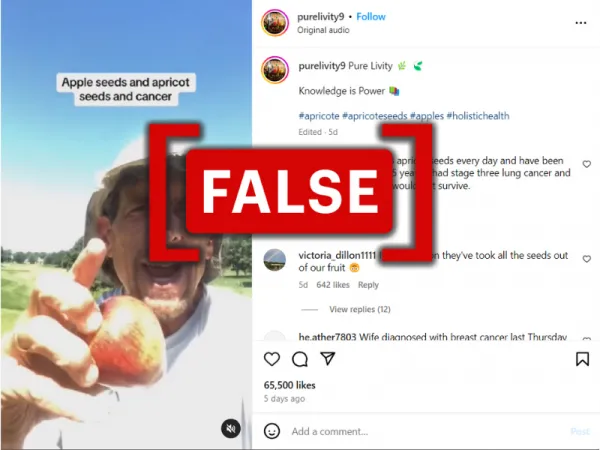By: Kari Nixon
July 19 2024
 An Instagram post claims apricot seeds cure cancer.
An Instagram post claims apricot seeds cure cancer.
Apricot seeds have never been shown to have cancer-fighting properties, and consuming them can be dangerous because of their cyanide content.
Context
On July 13, 2024, a video was posted on Instagram (archived here) claiming that apple and apricot seeds cure cancer. According to the person in the video, the cyanide naturally present in the seeds attracts cancer cells, which are then killed by the cyanide. The speaker mentions a book called World Without Cancer by G. Edward Griffith as his source. He says apricot seeds were sold in the 1980s in health food stores alongside the book but that the U.S. government subsequently restricted the sale of the seeds.
The speaker also advises his listeners: "If you want to be cured of cancer permanently, don't go do chemo-radiation – apricot seeds."
As of July 18, 2024, this post had gained 1.4 million views and 60,500 likes. However, the claim is false.
In fact
For more insight, we contacted Amy Whitaker, Assistant Professor in Nuclear Dynamics and Cancer at the Fox Chase Cancer Center.
She said, "Raw apricot seeds contain a compound called amygdalin, which is converted into hydrogen cyanide in your digestive tract. While some people believe that this cyanide can kill cancer cells, there is no scientific evidence it specifically targets only cancer cells, and you can get sick or die if you eat a lot of it from the cyanide toxicity.
"It is important to follow the science, and so far, there are no controlled clinical trials on humans demonstrating amygdalin, or its synthetic counterpart laetrile, are safe and have any anticancer effects.
"Following it being falsely pushed as an anticancer drug, the FDA [the U.S. Food and Drug Administration] has banned laetrile since the 1970s, and the FDA processes are rigorous and trustworthy. It is understandable that desperate people seek these things in the face of a cancer diagnosis, but it is safest to stick to what the scientific evidence shows is effective and safe, and that means avoiding the consumption of apricot seeds."
Further research supports Whitaker's statement and reveals more about the science and history of laetrile. Going under the name laetrile, or sometimes amygdalin, claims about apricot seeds' cancer-fighting ability date back to the 1950s. Ernst T. Krebbs, Jr., a man who called himself a biochemist but had been expelled from medical school and had no graduate degrees, began touting it as a cancer curative. The cyanide inherent in the seeds has typically been a part of explaining the fruit's cancer-fighting properties.
As early as 1953, the California Medical Association released a study pushing back against these claims, advising that "no satisfactory evidence has been produced to indicate any significant cycotoxic effect of Laetrile on the cancer cell."
By the 1970s, patient pressure against the FDA to allow the use of the drug was mounting, culminating in a major court case involving the Green family, who wanted to forego chemotherapy in their young son's leukemia treatment, opting instead for laetrile. When the court mandated that the Greens administer chemotherapy and not laetrile to their son, the Greens fled to Mexico to continue the use of laetrile. Shortly after their move to Mexico, the Greens also decided to cease their son's chemotherapy treatment – three months later, he died.
Diana Green has since written a book about her experiences, expressing regret at her actions and supporting the doctor's chemotherapy recommendations. In the book, she urges readers, "But do not negate your doctor's advice or any prescribed medication, unless that option has failed."
Because of this high-profile series of events, the inefficacy of laetrile (or apricot seeds) in fighting cancer is relatively well-documented. Cancer Research U.K. says, "There isn't any scientific evidence that laetrile is an effective treatment for cancer or any other illness." Their findings link to a systematic Cochrane Library review of the substance in 2015. A systematic review involves many experts researching the available evidence together and coming to a consensus. In the Cochrane Library review, experts found that: "The claims that laetrile or amygdalin have beneficial effects for cancer patients are not currently supported by sound clinical data. There is a considerable risk of serious adverse effects from cyanide poisoning after laetrile or amygdalin, especially after oral ingestion."
Indeed, the National Cancer Institute (a division of the National Institutes of Health) confirms this: "Laetrile has shown…no anticancer activity in human clinical trials."
Because of their cyanide content, apricot stones or the small seeds inside them are not generally recommended for consumption.
The verdict
The claims about apricot seeds fighting cancer are not new, and experts have consistently disproven them.